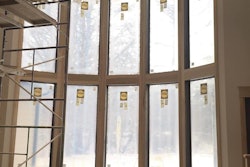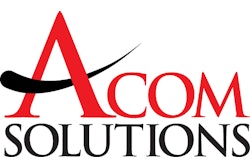Tech company touts security of new chip for use in payment cards
Dallas, TX — January 19, 2005 — Texas Instruments this week announced plans to deliver ISO/IEC 14443-compliant radio frequency identification (RFID) chips designed to meet the stringent security requirements for MasterCard International's PayPass line of RFID payment cards and tokens.
TI expects to submit this product for MasterCard certification in the second quarter of 2005. Full production is planned to start in the second half of this year
TI said its new 13.56 MHz RFID chip is the latest to be introduced in a series of solutions based on the company's ISO/IEC 14443 technology platform. This platform features products with standardized cryptography, using National Institute of Standards and Technology (NIST) approved crypto algorithms, including Triple DES and SHA-1.
The ISO/IEC 14443 standard allows for this increased level of security because it supports significantly faster rates of data exchange (up to 848 kbits per second), enabling more complex security information to be passed between an RFID card and reader without affecting the user's experience, TI said. As an added feature, read ranges for products based on the ISO/IEC 14443 platform are also limited to 4 centimeters (roughly 1.5 inches), further increasing the security of the transaction.
As credit and bank card issuers expand pilots throughout the United States and into other countries, TI believes that its opportunity to serve this market with its secure ISO/IEC 14443 solutions is significant. The December 2004 Nilson Report indicates that payment card manufacturers shipped 4.38 billion units to card issuers (Visa, MasterCard, American Express, Diners Club, Discover, JCB and ATM cards) and retailers (both credit and pre-paid cards) in 2003. In the first half of 2004, MasterCard's customer financial institutions worldwide had issued more than 627.5 million MasterCard-branded cards, a 6.6 percent increase over the same period in 2003, according to an August 2004 MasterCard press release.
"The financial services industry recognizes that ISO/IEC 14443-based RFID solutions provide the stringent levels of security required for conducting payment transactions," said Shawn Rogers, director of wireless commerce and Tag-it products at Texas Instruments RFid Systems. "With our heritage in pioneering technologies in new markets, we're working with leading bank card issuers and credit card companies to bring these highly reliable and secure RFID solutions to this market."
For a contrary view of the future of the RFID market, see the article "The O'RFID Factor: A 'No Spin' Look at Where Radio Frequency Identification Is Headed," in the October/November 2004 issue of Supply & Demand Chain Executive.
For more information on trends relating to radio frequency identification, follow this link for an extensive listing of SDCExec.com articles, featuring the latest research findings on the RFID, including adoption, return on investment and barriers to implementation.
Dallas, TX — January 19, 2005 — Texas Instruments this week announced plans to deliver ISO/IEC 14443-compliant radio frequency identification (RFID) chips designed to meet the stringent security requirements for MasterCard International's PayPass line of RFID payment cards and tokens.
TI expects to submit this product for MasterCard certification in the second quarter of 2005. Full production is planned to start in the second half of this year
TI said its new 13.56 MHz RFID chip is the latest to be introduced in a series of solutions based on the company's ISO/IEC 14443 technology platform. This platform features products with standardized cryptography, using National Institute of Standards and Technology (NIST) approved crypto algorithms, including Triple DES and SHA-1.
The ISO/IEC 14443 standard allows for this increased level of security because it supports significantly faster rates of data exchange (up to 848 kbits per second), enabling more complex security information to be passed between an RFID card and reader without affecting the user's experience, TI said. As an added feature, read ranges for products based on the ISO/IEC 14443 platform are also limited to 4 centimeters (roughly 1.5 inches), further increasing the security of the transaction.
As credit and bank card issuers expand pilots throughout the United States and into other countries, TI believes that its opportunity to serve this market with its secure ISO/IEC 14443 solutions is significant. The December 2004 Nilson Report indicates that payment card manufacturers shipped 4.38 billion units to card issuers (Visa, MasterCard, American Express, Diners Club, Discover, JCB and ATM cards) and retailers (both credit and pre-paid cards) in 2003. In the first half of 2004, MasterCard's customer financial institutions worldwide had issued more than 627.5 million MasterCard-branded cards, a 6.6 percent increase over the same period in 2003, according to an August 2004 MasterCard press release.
"The financial services industry recognizes that ISO/IEC 14443-based RFID solutions provide the stringent levels of security required for conducting payment transactions," said Shawn Rogers, director of wireless commerce and Tag-it products at Texas Instruments RFid Systems. "With our heritage in pioneering technologies in new markets, we're working with leading bank card issuers and credit card companies to bring these highly reliable and secure RFID solutions to this market."
For a contrary view of the future of the RFID market, see the article "The O'RFID Factor: A 'No Spin' Look at Where Radio Frequency Identification Is Headed," in the October/November 2004 issue of Supply & Demand Chain Executive.
For more information on trends relating to radio frequency identification, follow this link for an extensive listing of SDCExec.com articles, featuring the latest research findings on the RFID, including adoption, return on investment and barriers to implementation.










